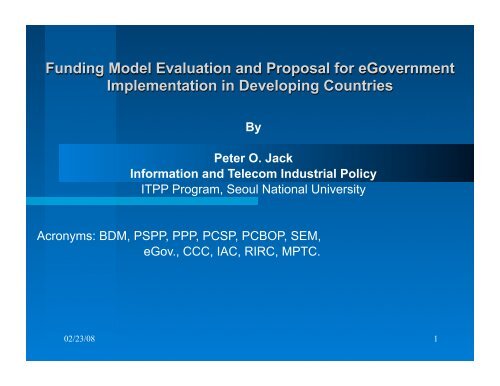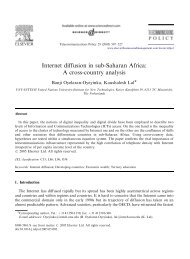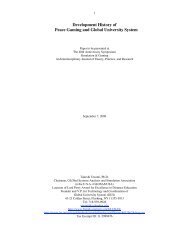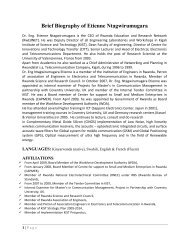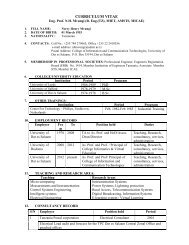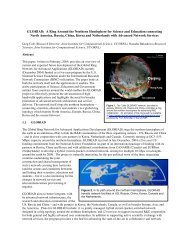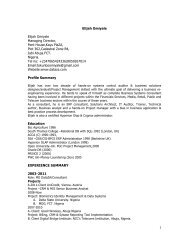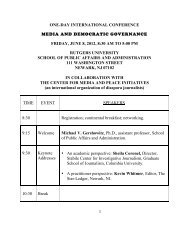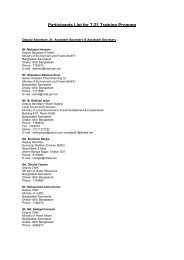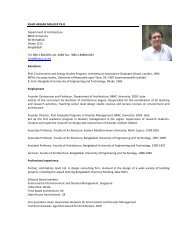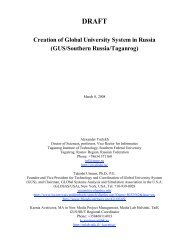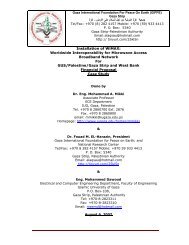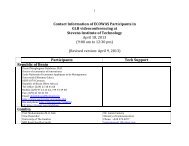PhD Thesis Proposal copy.pdf - Friends and Partners
PhD Thesis Proposal copy.pdf - Friends and Partners
PhD Thesis Proposal copy.pdf - Friends and Partners
Create successful ePaper yourself
Turn your PDF publications into a flip-book with our unique Google optimized e-Paper software.
Funding Model Evaluation <strong>and</strong> <strong>Proposal</strong> for eGovernment<br />
Implementation in Developing Countries<br />
By<br />
Peter O. Jack<br />
Information <strong>and</strong> Telecom Industrial Policy<br />
ITPP Program, Seoul National University<br />
Acronyms: BDM, PSPP, PPP, PCSP, PCBOP, SEM,<br />
eGov., CCC, IAC, RIRC, MPTC.<br />
02/23/08 1
Outline<br />
l Motivation<br />
l<br />
Abstract<br />
l<br />
Research Focus<br />
l<br />
Research Question<br />
l<br />
Methodology (Modelling <strong>and</strong> Simulation)<br />
l<br />
Some eGovernment Matrices<br />
– <strong>Partners</strong>hip Matrix<br />
– Funding Matrix s<br />
– Management Matrix<br />
l<br />
International Agency eGovernance Funding Activities: UNDP<br />
Case Study<br />
l<br />
Possible Contribution<br />
l<br />
l<br />
Way Forward<br />
– E-Nigeria 2008: eGov4D<br />
Reference<br />
2
Motivation<br />
l<br />
Depleting Resources available to developing economy governments make<br />
funding eGovernment Projects challenging if not elusive.<br />
l<br />
The private sector component of pure PPP models make them more profit<br />
oriented than is socially desirable, resulting in higher pricing of eGovernment<br />
services, thereby negating the general social welfare aim of government<br />
l<br />
Different phases of eGovernment implementation seemingly attract different<br />
funding mixes (Information, Forms, Transactions, One Stop Portals,<br />
Transformational-change management <strong>and</strong> Process re-engineering.<br />
l<br />
eGovernment Infrastructures (PPP), Middleware (Government) <strong>and</strong> Services/<br />
Centres (PSPP, PCSPs, PCBOPs, community based entrepreneurs) also<br />
require different partnership <strong>and</strong> financing models.<br />
l<br />
Access to a broader funding base such as International Grants <strong>and</strong> Soft<br />
Developmental Loans (UN System, World Bank <strong>and</strong> its Agencies, Country<br />
Developmental Agencies like USAID, DFID, CIDA, KOICA, etc).<br />
02/23/08 3
Abstract<br />
l<br />
eGovernment implementation in developing countries is<br />
generally faced with a myriad of challenges, ranging from<br />
uncoordinated efforts by stakeholders <strong>and</strong> a dearth of Strategic<br />
Leadership, to severe funding constraints.<br />
l<br />
This work aims to identify, analyze, evaluate <strong>and</strong> compare the<br />
various partnership models available for Strategic eGovernment<br />
implementation, namely: Public Private <strong>Partners</strong>hip (PPP),<br />
Public Civil Society <strong>Partners</strong>hip (PCSP), Public Social Private<br />
<strong>Partners</strong>hip (PSPP), <strong>and</strong> Social Enterprise Model to ascertain the<br />
optimal funding/business model for eGovernment projects in<br />
developing economies.<br />
l<br />
The effort will be geared towards proposing effective investment<br />
<strong>and</strong> financing models including consideration of the approaches<br />
to the co-ordinated acquisition of ICT, assessment of costs <strong>and</strong><br />
benefits of e-government, <strong>and</strong> the roles of the civil society <strong>and</strong><br />
the private sector.<br />
l<br />
Additionally, regarding operational management, robust <strong>and</strong><br />
transparent governance <strong>and</strong> management structures for the<br />
implementation of e-government projects involving both private<br />
sector firms <strong>and</strong> civil society organisations will be explored for<br />
different levels of service provision, i.e., at the Federal, State,<br />
Local 02/23/08 Government, <strong>and</strong> Community levels.<br />
4
eGovernment Evolution<br />
02/23/08 5
Research Focus<br />
l<br />
The aim is to do a Comparative analysis (Using Cost Modelling or Cost<br />
Benefit Analysis) of the partnership models (PPP, PSPP, PCSP, PCBOP,<br />
<strong>and</strong> SEM) to provide the basis for developing optimal business<br />
partnership models for layered (Federal, State, LGA) eGovernment<br />
services delivery, using Business Dynamics Modelling.<br />
l<br />
The research will also examine how low-income groups (rural<br />
community dwellers) can be effectively engaged in contributing to<br />
local content development as part of the eGovernment business<br />
network.<br />
l<br />
eGovernment Service Delivery Centre models (CCC, MPTC, IAC, RIRC,<br />
eKiosks, etc) will be compared to ascertain the efficient <strong>and</strong> effective<br />
centre deployment mix.<br />
02/23/08 6
Research Questions<br />
l An attempt will be made to answer some crucial questions:<br />
l<br />
What does ‘partnership’ mean in the e-government context<br />
l<br />
What role can private sector firms <strong>and</strong> civil society organisations play<br />
in the implementation <strong>and</strong> provision of e-government<br />
l<br />
Are there areas <strong>and</strong> tasks where these players may be more effective<br />
than government agencies Is Outsourcing a viable option<br />
l<br />
What are the likely benefits, <strong>and</strong> possible issues, with such<br />
involvement<br />
l<br />
Key Question: Which business models (or Mixed Models) offer the<br />
optimal choice for financing, implementing <strong>and</strong> Operating<br />
eGovernment Projects/Services in developing countries<br />
02/23/08 7
Methodology (Modeling <strong>and</strong> Simulation)<br />
l<br />
Business Dynamics Modeling based on pioneering work by<br />
Prof. Jay Forrester, Germeshausen Professor Emeritus of<br />
Management, MIT-Sloan School of Management.<br />
l<br />
Choice of other comparative Cost models such as<br />
– Cost Benefit Analysis,<br />
– Value Measuring Methodology<br />
– Cost Modeling<br />
l<br />
Cost Data will be based on Nigeria, Ghana, South Africa,<br />
Macau, India, UAE, Egypt, Kenya, Ug<strong>and</strong>a, <strong>and</strong><br />
benchmarking based on Korean eGovernment experience<br />
02/23/08 8
Business Dynamics Modelling<br />
l<br />
Business Dynamics (which evolves from System Dynamics) is a unique MIT-developed<br />
framework for underst<strong>and</strong>ing <strong>and</strong> managing complex businesses <strong>and</strong> organizations.<br />
l<br />
The field of system dynamics <strong>and</strong> the systems thinking <strong>and</strong> learning technologies that<br />
underlie business dynamics were invented <strong>and</strong> developed at MIT.<br />
l<br />
Professor John Sterman, is the developer of many management flight simulators, head<br />
of the MIT System Dynamics Group, <strong>and</strong> the author of the award-winning book,<br />
“Business Dynamics”.<br />
l<br />
Renowned MIT Sloan Senior Lecturer Peter Senge popularized systems thinking in his<br />
best-selling book, The Fifth Discipline: The Art <strong>and</strong> Practice of the Learning<br />
Organization.<br />
l<br />
Professor Emeritus Jay W. Forrester pioneered the field of system dynamics. MIT’s<br />
Approach to Diagnosing <strong>and</strong> Solving Complex Business Problems<br />
l<br />
System dynamics is a powerful framework for identifying, designing, <strong>and</strong> implementing<br />
high-leverage interventions for sustained success in complex systems.<br />
02/23/08 9
Issues we can address using Business Dynamics Modelling:<br />
l Impact of re-organizing or rationalizing Regional/State/Community eGovernment<br />
Service/Communication Centres <strong>and</strong> teams.<br />
l<br />
The impact or benefits of a new automated front end to eGovernment Service/Call<br />
Centres<br />
l<br />
The need to underst<strong>and</strong> the effects on service level after merging or scaling up the<br />
service/call centres<br />
l Underst<strong>and</strong>ing the effects of becoming a multi-purpose service/call/contact centre<br />
l<br />
Are there queues Do we underst<strong>and</strong> how, why <strong>and</strong> when they build up <strong>and</strong> what can we<br />
do to reduce them<br />
l<br />
Which improvement or combination of improvements will give us the best service or<br />
return<br />
02/23/08 10
l<br />
l<br />
l<br />
l<br />
Cost-Benefit Analysis: Elements of the analysis<br />
A. Costs<br />
1. Pre-implementation: Internal investments for infrastructure <strong>and</strong> work-process<br />
redesign<br />
2. Implementation: Costs of building the portal<br />
3. Operational costs: Portal administration <strong>and</strong> maintenance costs<br />
l<br />
l<br />
l<br />
l<br />
B. Benefits<br />
1. Benefits to the governmental agency<br />
2. Benefits to the citizen/customer<br />
3. General/mutual benefits<br />
l<br />
l<br />
l<br />
l<br />
l<br />
l<br />
l<br />
l<br />
C. Risks<br />
1. Political risk<br />
2. Organizational risk<br />
3. User risk<br />
4. Technological risk<br />
5. Vendor risk<br />
6. Execution risk<br />
7. Concentration risk<br />
Source: Cost-Benefit Analysis of e-Government Investments, Sorin Kertesz, Havard University (2003)
Snapshot of Value Measuring Methodology (VMM)<br />
Techniques <strong>and</strong> Tools<br />
02/23/08 12<br />
Source: Building a Methodology for Measuring the Value of e-Services, Mechling, Jerry, BAH (2002)
Some eGovernment Matrices<br />
– Component-<strong>Partners</strong>hip Matrix<br />
– Funding-<strong>Partners</strong>hip Matrix<br />
– Management-<strong>Partners</strong>hip Matrix<br />
02/23/08 13
<strong>Partners</strong>hip<br />
Model<br />
Government<br />
Component<br />
Governmen<br />
t<br />
PPP PSPP PCSP PCBOP PCP SEM Outsource<br />
d Service<br />
Model<br />
COMSAT X X X<br />
Internet Exchange<br />
Points<br />
X<br />
X<br />
BACKBONE X X<br />
DATACENTRES X X X<br />
MIDDLEWARE<br />
Government<br />
Network<br />
X<br />
X X X<br />
Government<br />
Portal<br />
Sectoral Solutions/<br />
Services<br />
Internet Access<br />
Centre<br />
/CCC/MPTC<br />
eKiosk/<br />
Multipurpose ATMs<br />
Content<br />
Development<br />
Partner<br />
X<br />
X<br />
X X X X X<br />
X X X X<br />
X X X<br />
X X X X
<strong>Partners</strong>hip<br />
Model<br />
Funding Source<br />
International<br />
Grants<br />
UN System<br />
Regional Union<br />
Grants (EU, AU,<br />
ASEAN)<br />
Country<br />
Development<br />
Agencies Aid<br />
Partner Equity<br />
World Bank Aid/<br />
Grants<br />
World Bank/IFC<br />
Soft Loans<br />
Government PPP PSPP PCSP PCBOP PCP SEM Outsource<br />
d Service<br />
Model<br />
X X X X X<br />
X X X X X<br />
X X X X<br />
X<br />
X<br />
X<br />
Short to medium<br />
term Commercial<br />
Credit<br />
Long Term<br />
Development<br />
Loans<br />
X<br />
X<br />
X<br />
Charitable Grants X X X<br />
x<br />
In-Country<br />
Development<br />
Grants<br />
Public Project<br />
Funding<br />
X X X X<br />
02/23/08 X<br />
15
Board/<br />
Management<br />
Structure<br />
<strong>Partners</strong>hip<br />
Model<br />
Governmen<br />
t<br />
PPP PSPP PCSP PCBOP PCP SEM Outsourced<br />
Service Model<br />
Government Board<br />
Government<br />
Management<br />
Private Board Observer<br />
Government Board<br />
Mixed Management<br />
x<br />
x<br />
x<br />
Mixed Board<br />
Professional<br />
Management<br />
Mixed Board<br />
Mixed Management<br />
x<br />
x<br />
x<br />
Select Committee<br />
Mixed Management<br />
X<br />
Private Board<br />
Private Management<br />
Government Board<br />
Observer<br />
Entrepreneur<br />
Government Monitoring<br />
Charity Board<br />
x<br />
x<br />
x<br />
x
Country<br />
<strong>Partners</strong>hip<br />
Models<br />
Funding<br />
Strategies<br />
Funding<br />
Sources<br />
Manageme<br />
nt<br />
Structures<br />
Project<br />
Description<br />
Project Benefits<br />
General<br />
Commen<br />
ts<br />
Nigeria<br />
Ghana<br />
South<br />
Africa<br />
Government,<br />
PPP, PCSP,<br />
PCBOP, PCP,<br />
OSM**.<br />
Government,<br />
PPP<br />
Government,<br />
PPP<br />
Guaranteed<br />
by Chinese<br />
Government<br />
Developmen<br />
tal Loan<br />
Contracto<br />
r Finance<br />
(HUAWE)<br />
World<br />
Bank<br />
Professiona<br />
l<br />
Managemen<br />
t<br />
COMSAT,<br />
BACKBONE, eGov.<br />
Portal, Sectoral<br />
Services .<br />
eGovernment<br />
Project<br />
County-wide<br />
(Pervasive) access to<br />
Internet Services<br />
Citizen Access to<br />
Government Services<br />
Online<br />
$200m<br />
$40m<br />
Egypt<br />
Government<br />
Morocco<br />
Government<br />
Kenya<br />
Government<br />
Ug<strong>and</strong>a<br />
Government<br />
Vietnam<br />
Government<br />
India<br />
Government<br />
United<br />
Arab<br />
Emirates<br />
Macau*<br />
Government<br />
Government<br />
South<br />
Korea*<br />
Government,<br />
OSM
<strong>Partners</strong>hip<br />
Model<br />
Operational<br />
Model<br />
BUILD X O<br />
Y<br />
Public Private PPP PSPP PCSP PCBOP PCP SEM Outsourc<br />
ed<br />
Service<br />
Model<br />
X X X X X Z<br />
OWN X O Y X X X X X Z<br />
OPERATE X O Y SP CS CBO C X Z<br />
*REGULATE<br />
O<br />
X,Y<br />
Z<br />
The highlighted box was obtained<br />
from<br />
“e-Infrastructure Funding” by<br />
Hwang, Altmann, <strong>and</strong> Bany (Working<br />
Paper 2007)<br />
02/23/08<br />
18
eGovt<br />
Project Description<br />
<strong>Partners</strong>hip<br />
Model<br />
Funding<br />
Sources<br />
Governance<br />
Structure<br />
Management<br />
Structure<br />
eGov. Admin<br />
Layer<br />
Federal<br />
Communicatio<br />
n Satellite<br />
Public<br />
(now PPP)<br />
Federal Backbone PPP<br />
(Now<br />
Private)<br />
Federal/State Network PPP<br />
Federal/State Middleware PSPP<br />
Federal/State<br />
Local Government<br />
Local Government<br />
Sectoral<br />
Solutions/<br />
Services<br />
Community<br />
Communicatio<br />
n Centre<br />
(Telecentre)<br />
Local Content<br />
Development<br />
PCSP<br />
PCBOP<br />
PCP<br />
Local Government Web<br />
SEM<br />
Communities<br />
Federal/State/LGA 02/23/08 Various Outsourci<br />
19<br />
ng
Country Management Level of Centralization Funding Comments<br />
Australia<br />
Canada<br />
National Office for the<br />
Information Economy<br />
Chief Information Officer<br />
Branch, Treasury Board of<br />
Canada<br />
Decentralized<br />
Collaborative<br />
approach<br />
Centralized Agencies<br />
continue to maintain some<br />
authority<br />
No central fund<br />
Expenditure determined<br />
by individual<br />
Agencies<br />
Central fund<br />
Supplemented<br />
by individual<br />
agencies<br />
Germany<br />
Bund Online<br />
2005 initiative,<br />
Federal<br />
Ministry of the<br />
Interior<br />
Decentralized<br />
Collaborative<br />
approach<br />
No central Fund Expenditure<br />
determined by individual<br />
agencies<br />
Bund Online funded<br />
by<br />
Annual contribution<br />
from each ministry,<br />
taken<br />
from IT budget<br />
Icel<strong>and</strong><br />
Information<br />
Society Task<br />
Force<br />
Centralized<br />
policy,<br />
Decentralized<br />
implementation<br />
Task force<br />
funds <strong>and</strong><br />
individual<br />
agencies<br />
Heavy use of<br />
outsourcing<br />
Irel<strong>and</strong><br />
Information<br />
Society Policy<br />
Unit<br />
Centralized<br />
The Information Society Fund,<br />
admin. By Dep. Of Finance<br />
Fund used only<br />
for innovative<br />
initiatives <strong>and</strong><br />
not for normal<br />
IT activities<br />
Republic of<br />
Korea<br />
The<br />
Presidential<br />
e-Government<br />
Committee<br />
Highly<br />
centralized<br />
Information Promotion Fund<br />
Source: Derived from 2nd OECD Symposium on e-Government, E-Government: Organizing for Integration, Country Papers, September 2003<br />
20
International Agency eGovernance Funding Activities:<br />
UNDP Case Study<br />
l<br />
l<br />
Methodology of e-Governance mapping<br />
The aims of the e-Governance mapping exercise were as follows:<br />
l<br />
o To capture how many e-Governance projects are currently being<br />
implemented;<br />
l<br />
o To assess the funding amounts in terms of UNDP contributions for each of<br />
the e-Governance projects;<br />
l<br />
o To assess the e-Governance projects by geographical location;<br />
l<br />
o To assess the e-Governance projects based on typology (four sub<br />
components as follows: Access <strong>and</strong> Connectivity, Access to Information<br />
through ICT, e-Government applications <strong>and</strong> Networking <strong>and</strong> networking<br />
applications);<br />
l<br />
o To update the ICTD yellow pages on the whole, this also including updates of<br />
staff information, pipeline projects, Source: e-assessments, Report on Mapping UNDP’s <strong>and</strong> e-Governance so forth. Projects, Valentina Azzarello (UN 2005)<br />
21
Source: Report on Mapping UNDP’s e-Governance Projects, Valentina Azzarello (UN 2005)<br />
02/23/08 22
Source: Report on Mapping UNDP’s e-Governance Projects, Valentina Azzarello (UN 2005)<br />
02/23/08 23
Source: Report on Mapping UNDP’s e-Governance Projects, Valentina Azzarello (UN 2005))<br />
02/23/08 24
How can partners respond to the Broad ICT agenda<br />
l<br />
Link ICT “push” to existing development projects <strong>and</strong> communities<br />
l<br />
Promote a more participatory, consultative approach in order to bridge the gap<br />
between local realities <strong>and</strong> the global/policy agenda<br />
l<br />
Develop culturally sensitive networking that can build partnerships <strong>and</strong> promote<br />
capacity-building <strong>and</strong> skills development at all levels of engagement<br />
l<br />
Encourage donors to work with partners – including civil society – to create an<br />
enabling environment for participation by civil society in policy processes <strong>and</strong> to<br />
strengthen the capacity of civil society to work for itself<br />
l<br />
Work with public <strong>and</strong> private sectors to develop better indicators to monitor the<br />
benefits of ICTs <strong>and</strong> their contribution to reaching the Millennium Development Goals<br />
(MDGs)<br />
l<br />
Introduce stronger monitoring <strong>and</strong> evaluation at both national <strong>and</strong> international levels<br />
to ensure that communication is linked to other processes, especially policy<br />
processes<br />
l<br />
Engage with civil society <strong>and</strong> the private sector for provision of infrastructure
How do we balance investment in technology with investment in content<br />
development<br />
l<br />
Recognize that development is not about technology <strong>and</strong> not about<br />
information<br />
l<br />
Recognize that technology is important, but must be<br />
appropriate – <strong>and</strong> sustainable<br />
l<br />
Focus more on content <strong>and</strong> less on machines<br />
l<br />
Encourage foundations <strong>and</strong> donors to invest in developing ICTs’ multimedia<br />
capabilities to support the needs of communities with strong oral traditions<br />
support internationalization of the Internet (beGrid/multilingual/Local<br />
Content)
Possible Contributions<br />
l<br />
A design Methodology <strong>and</strong> blended<br />
business models for eGovernment<br />
partnerships <strong>and</strong> services delivery <strong>and</strong><br />
Community Business Building.<br />
l<br />
A Cook-book/Guide for eGovernment<br />
Funding Models in Developing Countries<br />
02/23/08 27
WAY FORWARD<br />
l<br />
l<br />
l<br />
Extensively explore the literature on eGovernment<br />
in Developing Countries.<br />
Identify Various Funding Models in actual/<br />
practical use as well as proposed by academia for<br />
developing countries.<br />
Organise an International Conference on<br />
eGovernment in Nigeria in 2008 inviting all the<br />
stakeholders, local <strong>and</strong> international.<br />
l<br />
Propose the Mixed <strong>Partners</strong>hip Models developed<br />
for real life applications in the implementation of<br />
eGovernment 02/23/08 in Developing Countries.<br />
28
E-Nigeria 2008: eGov4D<br />
l<br />
Theme:<br />
eGovernment for Development: Maximising the gains eGovernment Implementation<br />
in Nigeria.<br />
l<br />
Sub-Theme:<br />
Sustainable Funding Models for eGovernment Infrastructure Development <strong>and</strong><br />
Services Delivery.<br />
l Specific Focus:<br />
– Taking Stock of eGovernment Projects<br />
– Unification of efforts, St<strong>and</strong>ardisation, <strong>and</strong> Integration of Services<br />
– Coordinating <strong>and</strong> integrating eGovernment, mGovernment, <strong>and</strong> Innovative<br />
Government (iGov.)<br />
– Layered Business Models (Federal, State, Local Government) Business Models for<br />
eGovernment Services delivery<br />
– Laying the Foundation for Strategic eGovernment Leadership<br />
– Re-engineering eGovernment for Good Governance<br />
– uGovernment: Planning for Next Generation eGovernment.<br />
– Repositioning ICT as a credible economic sector in its own right.<br />
– Engaging ICT as a catalyst for multi-sector economic development.<br />
02/23/08 29
Stakeholders<br />
l<br />
l<br />
l<br />
l<br />
l<br />
l<br />
l<br />
l<br />
l<br />
l<br />
l<br />
l<br />
l<br />
l<br />
Presidency<br />
Federal Capital Territory Administration (FCTA)<br />
Federal Ministry of Science <strong>and</strong> Technology (FMST)<br />
Federal Ministry of Information <strong>and</strong> Communication (FMIC)<br />
National Planning Commission (NPC)/Chief Economic Adviser<br />
National Information Technology Development Agency (NITDA)<br />
National Communication Commission (NCC)<br />
National Space Research <strong>and</strong> Development Agency (NSRDA)<br />
National Board for Technology Incubation (NBTI)<br />
Small <strong>and</strong> Medium Enterprise Development. Agency (SMEDAN)<br />
National Poverty Eradication Program (NAPEP) - (PCP)<br />
Petroleum Technology Development Fund (PTDF)<br />
New <strong>Partners</strong>hip for African Development (NEPAD)<br />
Niger Delta Development Commission (NDDC)
Stakeholders<br />
l<br />
l<br />
l<br />
l<br />
l<br />
l<br />
l<br />
l<br />
l<br />
l<br />
l<br />
l<br />
l<br />
l<br />
Lagos State Government<br />
Ogun State Government<br />
Enugu State Government<br />
Imo State Government<br />
Rivers State Government<br />
Bayelsa State Government<br />
Delta State Government<br />
Cross River State Government<br />
Kaduna State Government<br />
Kano State Government<br />
Niger State Government<br />
Jigawa State Government<br />
Bornu State Government<br />
Sokoto State Government
Stakeholders<br />
l<br />
l<br />
l<br />
l<br />
l<br />
l<br />
l<br />
l<br />
l<br />
l<br />
l<br />
National eGovernment Strategies Limited (NeGSt)<br />
Galaxy Backbone Limited (Galaxy)<br />
Nigeria Computer Society (NCS)<br />
Association of Telecommunications Operators in Nigeria<br />
(ATCON)<br />
Computer Professionals Council in Nigeria (CPN)<br />
*Information Technology Policy Program (ITPP), SNU, Korea<br />
*Seoul Metropolitan Government (SMG)<br />
*United Nations University (UNU-IIST), Macau.<br />
*Gulf Cooperative Council (GCC)-Datamatix, Dubai, UAE.<br />
Prof. Richard Heeks, eGov Specialist, Univ. of Manchester, UK.<br />
Emeritus Prof. Jay Forrester, MIT_Sloans School of<br />
Management
International Participants<br />
l<br />
l<br />
l<br />
l<br />
l<br />
l<br />
l<br />
l<br />
Korean Embassy in Nigeria<br />
UN System Member Agencies (UNDP, UNIDO, UNESCO, UNCTAD, etc)<br />
World Bank <strong>and</strong> Stakeholder Agencies (INFODEV, GICTD, etc)<br />
Regional Union Agencies (Commonwealth, EU, AU, ASEAN, GCC)<br />
Country Aid Agencies (KOICA, JICAD, USAID, DFID, CIDA, etc)<br />
International Charities (Faith Foundation, Bill & Melinda Gates Foundation, etc,)<br />
Ghana, South Africa, Kenya, Ug<strong>and</strong>a, Morocco, Egypt<br />
UAE, India, Vietnam, Macau, South Korea
Conference Budget Estimate<br />
Budget Item<br />
Unit Cost <strong>and</strong><br />
Frequency<br />
Base<br />
Quantity<br />
Description<br />
Sub-Total<br />
Conference Hall<br />
1<br />
Main Hall for Event<br />
Session Rooms<br />
3 a) Funding Models breakout room<br />
b) ICT4ED breakout Room<br />
c) Nigerian Stakeholders’ eGov.<br />
Harmonization Forum<br />
Sponsored<br />
Participants (Tickets,<br />
Lodging, <strong>and</strong> Meals)<br />
30<br />
ITPP participants, Paper Presenters/Country<br />
Representatives<br />
Conference Materials<br />
<strong>and</strong> Logistics (Bags,<br />
Printing, Paper ,<br />
Pens, Local Travel)<br />
300<br />
Group Lunches <strong>and</strong><br />
Dinners<br />
300<br />
Gr<strong>and</strong> Total
l<br />
Project Description:<br />
l UNU-IIST will carry out four projects in 2007:<br />
1. Strategic IT Planning for Macao Government<br />
2. Software Infrastructure for e-Government in Macao<br />
3. St<strong>and</strong>ards for e-Government in Macao, <strong>and</strong><br />
4. Macao e-Government events.<br />
l<br />
l<br />
l<br />
l<br />
Project Assessment<br />
All four e-Macao projects executed by the Center are executed as planned.<br />
Project Funding<br />
All four projects are funded by Macao Government through the Public Administration <strong>and</strong> Civil<br />
Services Bureau (SAFP).<br />
l<br />
l<br />
l<br />
l<br />
Project Collaborations:<br />
All four projects collaborate with:<br />
One or more of the other cooperation parties of the e-Macao Program, which are the University of<br />
Macau, the Institute of System <strong>and</strong> Computer Engineering - Macau, Macau University of Science<br />
<strong>and</strong> Technology, <strong>and</strong> Macau Polytechnic Institute.<br />
Selected Macao Government agencies.<br />
Source: http://www.egov.iist.unu.edu/cegov/projects/emacao<br />
35
SMG’s eGovernment Technical Assistance Scheme<br />
Seoul City has now<br />
exported the e-Government<br />
Model to Ankara, Turkey<br />
(May 2007) in addition to<br />
Moscow, Russia (November<br />
2004), Hanoi, Vietnam (July<br />
2005) <strong>and</strong> Ulaanbaatar,<br />
Mongolia (September<br />
2005).<br />
CIO (SMG) <strong>and</strong> Director of Ankara’s IT Department<br />
02/23/08 36
02/23/08 37
References<br />
l<br />
Business Dynamics: Systems Thinking <strong>and</strong> Modelling for a complex World, John D. Sterman (2000) Irwin/<br />
McGraw-Hill<br />
l<br />
The Development Of Systems Thinking Skills Using System Dynamics Modeling Tools" Günther Ossimitz<br />
(1997)<br />
l Cost-Benefit Analysis of e-Government Investments, Sorin Kertesz, Havard University (2003)<br />
l Building a Methodology for Measuring the Value of e-Services, Mechling, Jerry, BAH (2002)<br />
l<br />
The Challenge of Evaluating M-Government, E-Government, <strong>and</strong> I-Government: What Should Be<br />
Compared With What, Robert D. Behn, Kennedy School of Government (1995)<br />
l E-government funding activities <strong>and</strong> strategies, Michael G. Mimicopuolos (2004)<br />
l Report on Mapping UNDP’s e-Governance Projects, Valentina Azzarello (UN 2005)<br />
l<br />
Role of UNDP in information <strong>and</strong> Communication technology for development (DP/2001/CRP.8)<br />
l<br />
http://english.seoul.go.kr/government/news/press/1245473_12148.html<br />
l<br />
02/23/08 38<br />
Substantial Volume of Articles Downloaded <strong>and</strong> currently under Review


